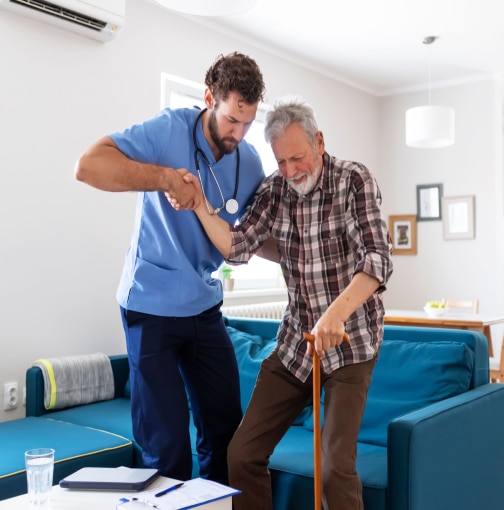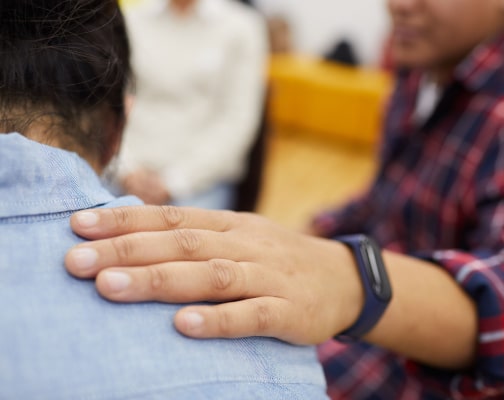Mesothelioma Caregivers
Home » National Mesothelioma Law Firm » Mesothelioma Cancer » Mesothelioma Caregivers

Medically Reviewed By:
Patricia Shelton, M.D.
- Page Last Updated:
- May 2, 2024
Medically Reviewed By:Patricia Shelton, M.D.
- Page Last Updated:
- May 2, 2024
The American Cancer Society defines a caregiver as an uncompensated person who carries out most of the caregiving duties. An estimated 48 million Americans 18 and older care for loved ones without pay, according to the AARP. Most caregivers are not prepared for the role, and too often, they forget their own needs as they devote resources to their loved ones.
What to Expect After a Mesothelioma Diagnosis
Everything changes when a patient is diagnosed with mesothelioma. Future plans and daily routines give way to doctor visits and managing symptoms and treatment side effects.
Symptoms
The symptoms of mesothelioma vary according to the type, stage, and other health factors. According to the Cleveland Clinic, patients with mesothelioma may experience the following symptoms:
- Fever
- Weakness
- Shortness of breath
- Chest pain
- Abdominal pain
- Nausea and vomiting
- Abnormal heart rhythm
- Trouble breathing
Treatment
Mesothelioma treatment carries a high risk of complications and severe side effects. Caregivers must maintain strong communication with the treatment team and learn to differentiate between expected side effects and serious complications, which could include the following:
- Infection
- Heart attack
- Kidney failure
- Multi-organ failure
- Inability to breathe without a ventilator
According to Moffitt Cancer Center, the most common side effects of mesothelioma treatment include the following:
- Fatigue
- Nausea and vomiting
- Pain
Physical and Emotional Dependence
Patients experiencing mesothelioma exhibit significant physical and emotional needs. Their physical symptoms may prevent them from caring for those necessities. They may experience complex emotions, including fear, grief, depression, and regret. And they rely on their caregivers for assistance with daily activities and emotional support.
The Impact of a Mesothelioma Diagnosis on Caregivers
A study by the International Journal of Environmental Research and Public Health revealed that caregivers are often more severely traumatized by the malignant mesothelioma diagnoses than the patients themselves. Caregivers may experience high levels of the following:
- Intrusive thoughts about death
- Guilt
- Depression, especially among female caregivers
- Fear
- Powerlessness
- Financial strain
- Isolation
- Exhaustion
The average age of a pleural mesothelioma diagnosis is 72, and many mesothelioma caregivers are elderly spouses with their own health challenges. Outside support is crucial for these caregivers.
How to Care for Someone With Mesothelioma
The increasing number of cancer treatments offered on an outpatient basis has resulted in sicker patients being cared for in the home. As confirmed by Assisting Hands Home Care, mesothelioma patients rely on their caregivers as important components of their treatment teams. Caregivers play a critical role in providing patients with comfort measures and motivating them to continue treatment when side effects become overwhelming.
Mesothelioma Education
Patients often do not understand their diagnosis or treatment. Caregivers who educate themselves about mesothelioma are better equipped to help patients cope with the symptoms and whether the side effects are a result of treatment. Caregivers can educate themselves by visiting the Lanier Law Firm’s mesothelioma information website.
Mental and Emotional Support
One of the most critical roles of a mesothelioma caregiver is mental and emotional support. Providing mesothelioma patients with companionship, normalcy, and reassurance during treatment can drastically improve the patient’s quality of life.
Cancercare recommends the following tips for caregivers providing end-of-life care:
- Create a peaceful environment.
- Expect changes in your loved one’s appetite and other needs.
- Be a good listener, and learn to be okay with silence.
- Attend to spiritual needs. Clergy can provide a strong degree of comfort to patients facing death.
- Don’t neglect humor. Laughter can be beneficial for both of you. There is no need to be solemn constantly.
- Don’t be afraid to express your feelings if your loved one asks.
- Ask your loved one if they need additional support.
- Respect your loved one’s wishes.
- Don’t be afraid to discuss death at your loved one’s comfort level.
Help With Daily Tasks
The majority of caregiver duties are devoted to performing daily tasks patients can no longer perform for themselves. Managing these tasks for the patient will help maintain a sense of normalcy and ensure the patient’s basic needs are met. The American Society of Clinical Oncology (ASCO) has identified the following tasks caregivers most commonly provide:
- Transportation to treatment
- Personal care, such as dressing, bathing, and toileting
- Housework
- Communication with health-care providers
- Meal prep
- Managing insurance and finances
Basic Medical Care
Caregivers may also find themselves in the position of having to provide some basic medical care. Learning to provide basic care at home can minimize trips to the doctor, which could be a source of stress for the patient and the caregiver. Common medical care that may be performed at home includes the following:
- Administration of breathing treatments
- Assisting with transitions in and out of a wheelchair
- Adjusting the patient’s position frequently when bedridden to avoid bedsores
- Medication management
- Pain management, including massages, medications, ice, or heat
- Basic wound care following surgery, such as changing dressings and applying ointments
Health Risks for Caregivers
According to a study reported by the American Psychological Association, caregivers are more likely than non-caregivers to neglect personal health. According to the study, caregivers are 26 percent more likely to forgo health insurance and 59 percent more likely to skip going to the doctor for a necessary health service due to the cost.
Mental Health Risks
The Family Caregiver Alliance has uncovered the following pervasive emotional and mental health risks for caregivers:
- Depression
- Anxiety
- Frustration
- Guilt
- Excess stress
- Substance abuse
- Feeling overwhelmed
- Helplessness
- Exhaustion
- Loss of self-identity
- Low self-esteem
- Constant worry
- Feelings of uncertainty
- Reduced self-acceptance
- Impaired feelings of effectiveness and control
- Cognitive decline
Physical Health Risks
The same report by the Family Caregiver Alliance revealed that approximately 11 percent of caregivers report worsened health and are more likely to experience the following health conditions:
- Heart attack
- Nearly double the instances of chronic conditions such as:
- Heart disease
- Diabetes
- Arthritis
- Diminished immune response
- A higher number of Infections
- Reduced antibody responses
- Delayed wound healing
- Higher incidence of cancers
- Elevated stress hormones
- A 63 percent higher mortality rate
- A reduction in self-care
- Decreased likelihood of participation in preventive health
- Increased likelihood of smoking
- Unhealthy eating habits
Caregiver Stress and Burnout
Burnout is a strong risk when caregivers try to take on all the responsibilities themselves. Caregiver burnout is also harmful to the patient. According to Caring Senior Service, caregiver stress can serve as a warning sign for burnout.
Signs and Symptoms
Signs and symptoms of caregiver stress may include the following:
- Anxiety
- Depression
- Irritability
- Fatigue
- Difficulty sleeping
- Changes in appetite
- Health issues
- Resentment
- Neglect of own responsibilities
- Social withdrawal
- Difficulty concentrating
It is normal to feel these symptoms occasionally, but if they become more pervasive, it could mean that you are burned out. Other signs and symptoms of caregiver burnout include the following:
- Significantly reduced energy levels
- Tendency to get sick
- Chronic fatigue
- Neglect of personal needs
- Inability to relax
- Hopelessness
Effects of Caregiver Burnout
In addition to the caregiver’s health risks, caregiver burnout can also adversely impact the patient. Mesothelioma patients are often already in a delicate state of health. Any added stress has the potential to do harm. A burned-out caregiver could lead to the patient feeling guilty and increase the patient’s stress, which must be controlled.
Burned-out caregivers are also more likely to make mistakes, such as providing the wrong medication or hurrying through daily tasks.

Caregiving Action Plan
An action plan can help caregivers avoid burnout by determining how care will be coordinated with other family members, friends, and outside agencies. The ASCO recommends including the following tasks in your action plan:
- Providing companionship for the patient (and breaks for the primary caregiver)
- Household tasks, including grocery shopping, meal prep, housework, and pet care
- Transportation to doctor appointments
- Keeping friends and family informed
- Providing various aspects of care, such as comfort measures and medication administration
- Coordinating doctor appointments, insurance billing, and medication pickup
When you complete an action plan early in your loved one’s cancer journey, you avoid taking on too much responsibility. This will increase the quality of care you offer your loved one.
Self-Care Techniques for Caregivers
Self-care tends to go against the grain of caregivers, but investing even a small amount of time and resources into yourself will benefit both you and your loved one. Your loved one’s disability and shortened life span may make you feel guilty for any enjoyment in your life. However, if you do not care for your own needs, you will have less to offer your loved one.
The National Cancer Institute suggests that the following practices can help you as a caregiver to avoid burnout and stay strong for the benefit of your loved one:
- Keep a journal.
- A journal provides a place to vent negative thoughts and emotions.
- You do not have to write in a journal every day.
- Focus on gratitude.
- According to Harvard Health Publishing, gratitude has a strong correlation to happiness.
- Maintain your sense of humor.
- Humor can relieve tension and make your circumstances feel less stressful.
- Take care of your physical needs.
- Eat healthy foods.
- Get enough rest.
- Exercise.
- Attend regular health screenings.
- Take prescribed medications.
It is important to develop your caregiving action plan in a way to assure you have the necessary time and resources to care for your own needs.
Stress Management Techniques
Caring for a loved one with mesothelioma is a significant stressor. Worry, fear, grief, and even anger are natural emotions for caregivers to experience, but without a healthy outlet, these emotions can lead to the health issues and burnout common among family caregivers.
Take Breaks
Many caregivers have a strong sense of obligation and feel guilty about taking breaks. It helps to surround yourself with supportive friends and family members who can reassure you that you are not letting your loved one down by resting.
Practice Mindfulness
Mindfulness activities promote relaxation and provide a mental respite. Long-Term Care News recommends the following mindfulness activities for caregivers:
- Breathing exercises
- Meditation
- Repeating a mantra
- Connecting with others
- Playing memory games
- Being present in the moment
Rely on Outside Help and Support
As a caregiver, you may believe that doing everything yourself makes you a better caregiver, but the opposite is true. Providing around-the-clock care to a mesothelioma patient requires more time and stamina than one person can muster.
Obtaining outside assistance is not shirking your duties. If you are the spouse, family member, or close friend of a mesothelioma patient, the care that patient needs most from you is emotional support, companionship, and meaningful moments.
When you wear yourself out trying to manage every aspect of your loved one’s care, you may become too physically and emotionally unavailable to enjoy whatever time you and your loved one have together. This only serves to compound your grief and create regrets later. However, you will never regret the quality time you enjoy with your loved one when you delegate care duties to others.
Resources for Caregivers
Mesothelioma caregivers have a multitude of options for outside assistance, even when funds are limited.
Caregiving Assistance
Hands-on assistance by friends, other family members, and even volunteers from the community can provide caregivers with much-needed time to themselves and peace of mind that their loved ones are in good hands. However, asking for assistance is challenging for many caregivers, many caregivers lack access to a network of friends and family who could help.
In these cases, caregivers can look toward professional organizations and businesses that specialize in home care and mesothelioma caregiver support to take on some of the responsibilities. Several types of home care services exist.

Home Health
Home health care is a combination of several services that are typically provided after a hospital stay. Home health services are covered by most insurance plans, including Medicare, Medicaid, and VA benefits. According to Medicare.gov, home health services include the following services:
- Wound care
- Patient and caregiver education
- Intravenous feeding
- Injections
- Health monitoring
The needs of a mesothelioma patient following surgery or other treatments can be intense. If the doctor fails to mention home health care, ask the doctor if it could be prescribed during at least the most difficult parts of recovery.
Non-Medical Home Service Providers
Multiple agencies provide in-home care services for adults. These agencies often market to elderly individuals who wish to age in place, but many of them also help younger adults with disabilities. These agencies assist with various activities of daily living, such as the following:











Thousands of in-home care providers exist across the United States. It is important to select a reputable agency that performs thorough background screenings of all workers. Well-known providers with a national presence include the following:
In-home care can occur on a limited basis or more extensively, including 24-hour care. These agencies typically charge by the hour. While 24-hour care may be cost prohibitive, many agencies are willing to provide services just a few times per month to give caregivers a break. This is also known as respite care.
Though Medicare does not typically cover non-medical services, financial assistance may still be available. Some Medicare Advantage plans may offer this benefit, according to the AARP. Coverage for in-home care is also available through the following programs:
- Medicaid: varies by state
- The Department of Veterans Affairs (VA): offers several programs that cover in-home services and respite care, some of which will even allow the veteran to pay the family caregiver
- Program of All-Inclusive Care for the Elderly: a program for Medicare or Medicaid recipients
- Covers expenses ordinarily covered by Medicare and Medicaid plus additional services deemed necessary by health-care providers to maintain the patient’s care outside a nursing home
- Premium for Medicare-only patients
- No premium for Medicaid patients
- No co-pays or deductibles
Area Agencies on Aging and Disability (AAAD)
Your local AAAD provides a variety of free services to support caregivers and their loved ones. You can find your local agency through Elder Locator or your local telephone directory. Services provided include the following:
- Homemaking services
- Respite care
- Meals-on-wheels: a meal delivery service to homebound adults
- Possible additional services in your local area
These services may have a waiting list.
Palliative Care and Hospice
Palliative care and hospice services provide comfort measures to patients with terminal illnesses to help improve their quality of life and offer practical support to patients and their caregivers. This can include housekeeping assistance, education, help with financial planning, and other needs.
The difference between hospice and palliative care is that patients seeking treatment are offered palliative care, and hospice is available to patients whose life expectancy is six months or less and who have opted to cease interventional treatment.
These services can provide a significant amount of support and relief to caregivers, and in the case of hospice, the support continues even after the patient has passed away.
Coverage for palliative care and hospice is available through Medicare, Medicaid, and the VA.
Caregiver Support Groups and Education
Mesothelioma caregivers face significant isolation and experience complex emotions that may be difficult for non-caregivers to understand. As public awareness of the caregiver’s plight increases, a rising number of governmental and private organizations have provided support groups where caregivers can share their experiences with others facing similar circumstances.


Local Support Groups
While it is unlikely that you will find a mesothelioma-specific caregiver support group in your local area, you may be able to find a cancer-specific caregiver support group. Even a general caregiver support group can be educational and uplifting. Local support groups provide an opportunity for caregivers to bond with other caregivers who could become friends for life.
Local caregiver support groups can be identified through the following means:
- Ask your oncologist or cancer hospital for information about local cancer and caregiver support groups.
- If your loved one receives care at a specialized mesothelioma treatment center, the treatment center likely facilitates a caregiver support group.
- Your local AAAD may have information about local caregiver support groups.
- For veterans enrolled in VA Healthcare, support groups, coaching, self-care, referrals, and more are available to caregivers through the following two programs located within local VA facilities:
- Caregiver Support Program
- Program of General Caregiver Support Services

Online Support Groups
Online support groups provide additional options:
- CanCare
- A program that matches caregivers with individuals who have previously cared for someone with cancer and who can provide emotional support
- Also matches cancer patients with survivors—allowing the patient to receive emotional support from other sources can take pressure off the caregiver
- Cancer Hope Network for patients and caregivers
- A program that matches patients and caregivers to supportive peers, similar to CanCare
- Inspire
- An online cancer support group
- MyLifeLine
- An online cancer support community
- Moderated discussion boards where caregivers and patients can connect with others
- An online forum to keep friends and family members informed
If you use social media, you may also find private caregiver support groups through your favorite social platform.

Additional Resources
The American Cancer Society offers free assistance, education, and emotional support. It also maintains a list of respite services in your area. This information is available by calling 1-800-227-2345.
The AARP Family Caregiving resource center provides free educational resources, including a resource line that can be accessed by calling 1-877-333-5885.
The Family Caregiver Alliance provides quality information, support, and resources to family caregivers through CareNav.

Legal Assistance
An AARP study revealed that caregivers spend an average of $7,242 in out-of-pocket expenses related to caregiving. This is often after having to sacrifice work hours or give up a job altogether. The financial strain of caring for mesothelioma patients contributes substantially to the stress mesothelioma caregivers face.
Your loved one’s mesothelioma diagnosis is almost certainly the result of asbestos exposure. The experienced asbestos attorneys at the Lanier Law Firm can help you and your loved one identify the source of exposure and hold those who facilitated it accountable.
Our mesothelioma attorneys can file a civil claim on your behalf and identify any trust funds from which you can collect. This will provide much-needed compensation to ameliorate your financial stress and ensure you and your loved one have access to the services you need. Contact us today to schedule a free consultation.
By submitting this form, you agree to our terms & conditions. Please read the full disclaimer



